九年级英语Unit9第1课时教案
- 格式:docx
- 大小:22.19 KB
- 文档页数:4
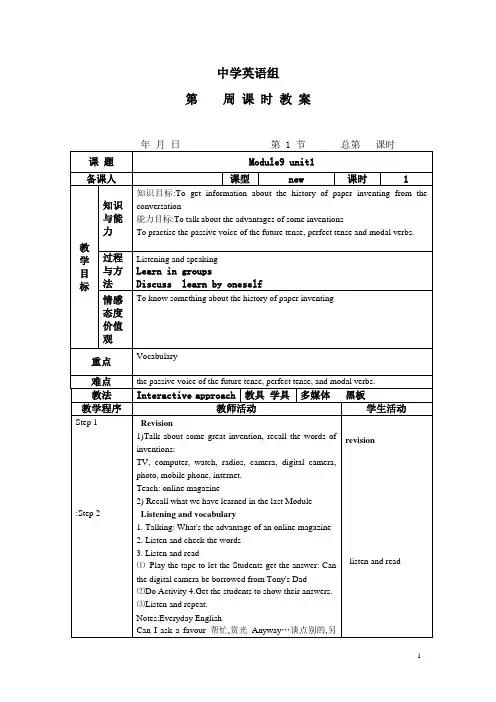
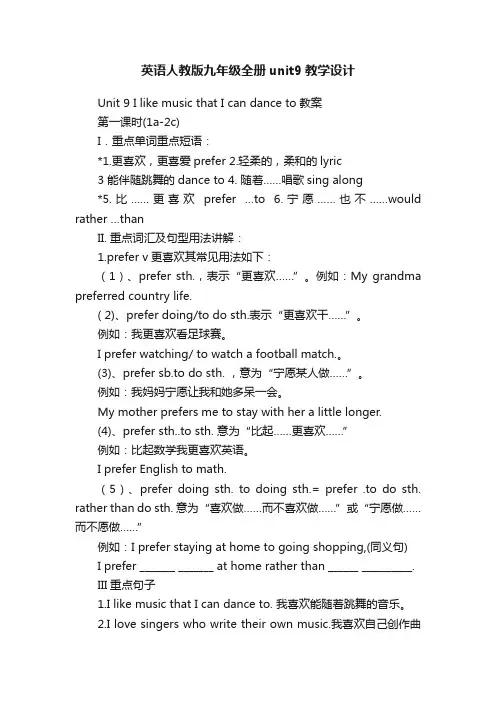
英语人教版九年级全册unit9教学设计Unit 9 I like music that I can dance to教案第一课时(1a-2c)I.重点单词重点短语:*1.更喜欢,更喜爱prefer 2.轻柔的,柔和的lyric3 能伴随跳舞的dance to 4. 随着……唱歌sing along*5.比……更喜欢prefer …to 6.宁愿……也不……would rather …thanII. 重点词汇及句型用法讲解:1.prefer v更喜欢其常见用法如下:(1)、prefer sth.,表示“更喜欢……”。
例如:My grandma preferred country life.( 2)、prefer doing/to do sth.表示“更喜欢干……”。
例如:我更喜欢看足球赛。
I prefer watching/ to watch a football match.。
(3)、prefer sb.to do sth. ,意为“宁愿某人做……”。
例如:我妈妈宁愿让我和她多呆一会。
My mother prefers me to stay with her a little longer.(4)、prefer sth..to sth. 意为“比起……更喜欢……”例如:比起数学我更喜欢英语。
I prefer English to math.(5)、prefer doing sth. to doing sth.= prefer .to do sth. rather than do sth. 意为“喜欢做……而不喜欢做……”或“宁愿做……而不愿做……”例如:I prefer staying at home to going shopping,(同义句)I prefer _______ _______ at home rather than ______ __________.III重点句子1.I like music that I can dance to. 我喜欢能随着跳舞的音乐。

Unit 9I like music that I can dance to.Section A (1a-2d)1.重点单词:prefer,lyrics,Australian,electronic,suppose,smooth,spare,case,director,war2.重点短语:sing along with,dance to,different kinds of,in that case3.重点句式:—What kind of music do you like?—I like music that I can sing along with.Carmen likes musicians who play different kinds of music.I prefer movies that give me something to think about.1.重点短语和句型2.定语从句定语从句一、预习课本P65-66新单词并背诵,完成下面的汉译英。
1.更喜欢________ 2.歌词________3.电子的________ 4.推想________5.平滑的________ 6.空闲________7.情况________ 8.导演________9.战争________ 10.澳大利亚的________二、认真预习1a-2d找出下列短语和句型。
1.随之唱歌________________________________________________________ ________________2.随着……跳舞________________________________________________________ ________________3.不同种类的________________________________________________________ ________________4.既然那样________________________________________________________ ________________5.—你喜欢什么种类的音乐?—我喜欢能跟着唱的音乐。
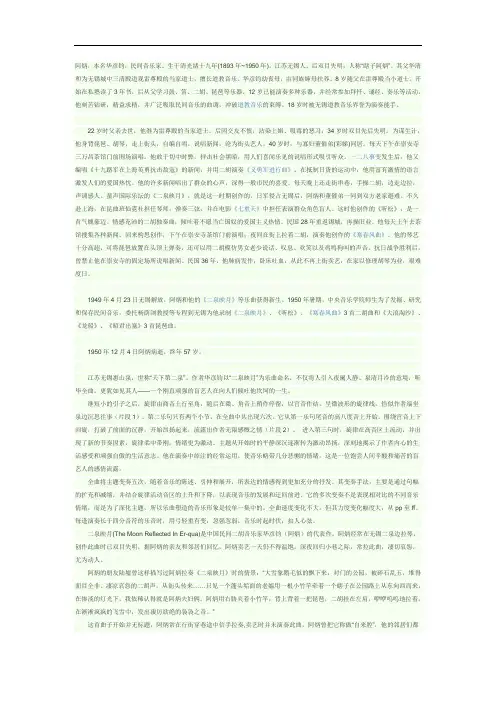
阿炳,本名华彦钧,民间音乐家。
生于清光绪十九年(1893年~1950年),江苏无锡人。
后双目失明,人称“瞎子阿炳”。
其父华清和为无锡城中三清殿道观雷尊殿的当家道士,擅长道教音乐。
华彦钧幼丧母,由同族婶母扶养。
8岁随父在雷尊殿当小道士。
开始在私塾读了3年书,后从父学习鼓、笛、二胡、琵琶等乐器。
12岁已能演奏多种乐器,并经常参加拜忏、诵经、奏乐等活动。
他刻苦钻研,精益求精,并广泛吸取民间音乐的曲调,冲破道教音乐的束缚。
18岁时被无锡道教音乐界誉为演奏能手。
22岁时父亲去世,他继为雷尊殿的当家道士。
后因交友不慎,沾染上娼、吸毒的恶习,34岁时双目先后失明。
为谋生计,他身背琵琶、胡琴,走上街头,自编自唱,说唱新闻,沦为街头艺人。
40岁时,与寡妇董催弟(彩娣)同居。
每天下午在崇安寺三万昌茶馆门前围场演唱。
他敢于切中时弊,抨击社会黑暗,用人们喜闻乐见的说唱形式吸引听众。
一二八事变发生后,他又编唱《十九路军在上海英勇抗击敌寇》的新闻,并用二胡演奏《义勇军进行曲》。
在抵制日货的运动中,他用富有激情的语言激发人们的爱国热忱。
他的许多新闻唱出了群众的心声,深得一般市民的喜爱。
每天晚上还走街串巷,手操二胡,边走边拉,声调感人。
蜚声国际乐坛的《二泉映月》,就是这一时期创作的。
日军侵占无锡后,阿炳和董催弟一同到双方老家避难。
不久赴上海,在昆曲班仙霓社担任琴师,弹奏三弦,并在电影《七重天》中担任表演群众角色盲人。
这时他创作的《听松》,是一首气魄豪迈、情感充沛的二胡独奏曲,倾吐着不愿当亡国奴的爱国主义热情。
民国28年重返锡城,再操旧业。
他每天上午去茶馆搜集各种新闻,回来构思创作,下午在崇安寺茶馆门前演唱;夜间在街上拉着二胡,演奏他创作的《寒春风曲》。
他的琴艺十分高超,可将琵琶放置在头顶上弹奏,还可以用二胡模仿男女老少说话、叹息、欢笑以及鸡鸣狗叫的声音。
抗日战争胜利后,曾禁止他在崇安寺的固定场所说唱新闻。
民国36年,他肺病发作,卧床吐血,从此不再上街卖艺,在家以修理胡琴为业,艰难度日。
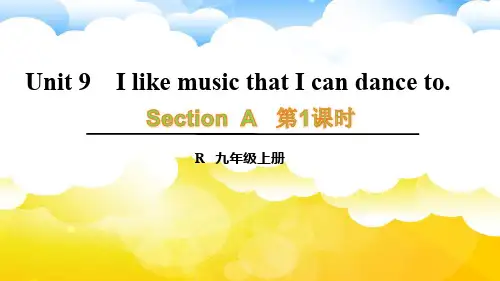

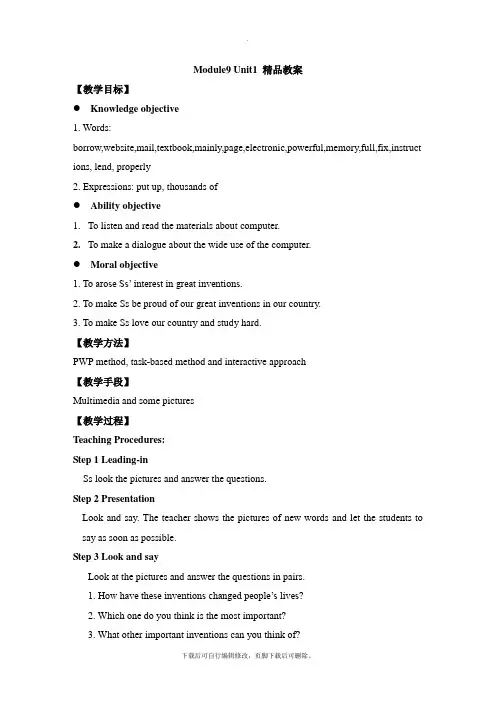
Module9 Unit1 精品教案【教学目标】●Knowledge objective1. Words:borrow,website,mail,textbook,mainly,page,electronic,powerful,memory,full,fix,instruct ions, lend, properly2. Expressions: put up, thousands of●Ability objective1.To listen and read the materials about computer.2.To make a dialogue about the wide use of the computer.●Moral objective1. To arose Ss’ interest in great inventions.2. To make Ss be proud of our great inventions in our country.3. To make Ss love our country and study hard.【教学方法】PWP method, task-based method and interactive approach【教学手段】Multimedia and some pictures【教学过程】Teaching Procedures:Step 1 Leading-inSs look the pictures and answer the questions.Step 2 PresentationLook and say. The teacher shows the pictures of new words and let the students to say as soon as possible.Step 3 Look and sayLook at the pictures and answer the questions in pairs.1. How have these inventions changed people’s lives?2. Which one do you think is the most important?3. What other important inventions can you think of?Step 4 ListeningⅠ. Listen and complete the sentences.1Linging loves her mobile phone because she can ______________.2All of Daming’s friends’ numbers are _______ in his phone.3Today’s cameras are better than old cameras because they do not ________ and the photos can ______________.4Lingling thinks everything ___________ by computer to some degree, so the computer is __________________ invention.Ⅱ. Listen to Part 3 and answer the following questions.1. What will Tony do on the school visit to the museum?2. Where did we get mainly information in the past?Step 5 Reading1.Find out the sentences which belong to the passive voice in the dialogue.1). They’ll be put up on the school website.2). And they can be seen on the Internet by other classes.3). Will computers be used more than books in the future?2.Now read the summary of the conversation. Underline the wrong informationand correct it.Tony wants to borrow his father’s camera and take some photos of the school dance and the basketball match. The photos will be shown in the school magazine. Tony’s dad lends the camera. He promises Tony to look after it.3.Find the sentences in the conversation which mean:1) Changing the subject, can I get the camera?2). It is not a problem. I will use another memory card.3) I will do what you tell me to do.4.Answer the questions.electronic fix instruction invention lend mail page website1) How do you fix a camera if the memory is full?2) When do you need to read the instructions?3) How often do you send messages by mail?4) How many pages does this book have?5) Which website do you often go to when you get online?6) What is an example of electronic technology?7) When you lend something to someone, what do they have to do later?8) What do you think is the most important invention in human history? Step 6 Everyday EnglishLet Ss say the everyday English that they have learnt in the passage.•I wonder …•Perhaps.•Here it is.•Promise!Step 7 Language points1. Can I borrow your camera?borrow表示“借入〞lend表示“借出〞borrow sth. from sb. 表示“向某人借某物〞。
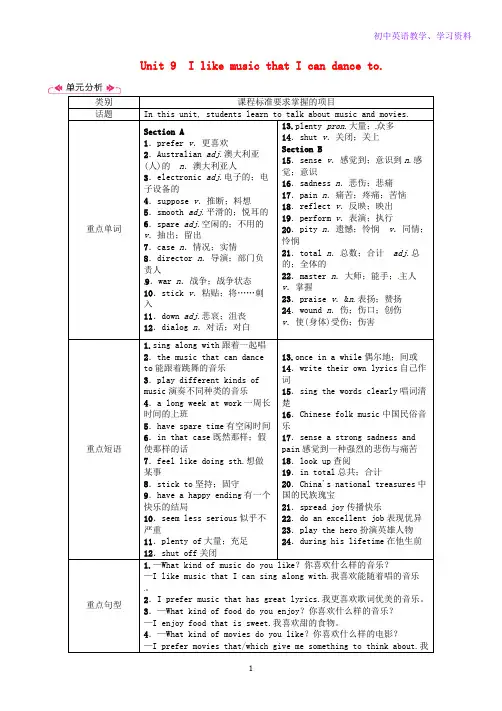
Unit 9 I like music that I can dance to.类别课程标准要求掌握的项目话题In this unit, students learn to talk about music and movies.重点单词Section A1.prefer v.更喜欢2.Australian adj.澳大利亚(人)的n.澳大利亚人3.electronic adj.电子的;电子设备的4.suppose v.推断;料想5.smooth adj.平滑的;悦耳的6.spare adj.空闲的;不用的v.抽出;留出7.case n.情况;实情8.director n.导演;部门负责人9.war n.战争;战争状态10.stick v.粘贴;将……刺入11.down adj.悲哀;沮丧12.dialog n.对话;对白13.plenty pron.大量;众多14.shut v.关闭;关上Section B15.sense v.感觉到;意识到n.感觉;意识16.sadness n.悲伤;悲痛17.pain n.痛苦;疼痛;苦恼18.reflect v.反映;映出19.perform v.表演;执行20.pity n.遗憾;怜悯v.同情;怜悯21.total n.总数;合计adj.总的;全体的22.master n.大师;能手;主人v.掌握23.praise v.&n.表扬;赞扬24.wound n.伤;伤口;创伤v.使(身体)受伤;伤害重点短语1.sing along with跟着一起唱2.the music that can danceto能跟着跳舞的音乐3.play different kinds ofmusic演奏不同种类的音乐4.a long week at work一周长时间的上班5.have spare time有空闲时间6.in that case既然那样;假使那样的话7.feel like doing sth.想做某事8.stick to坚持;固守9.have a happy ending有一个快乐的结局10.seem less serious似乎不严重11.plenty of大量;充足12.shut off关闭13.once in a while偶尔地;间或14.write their own lyrics自己作词15.sing the words clearly唱词清楚16.Chinese folk music中国民俗音乐17.sense a strong sadness andpain感觉到一种强烈的悲伤与痛苦18.look up查阅19.in total总共;合计20.China's national treasures中国的民族瑰宝21.spread joy传播快乐22.do an excellent job表现优异23.play the hero扮演英雄人物24.during his lifetime在他生前重点句型1.—What kind of music do you like?你喜欢什么样的音乐?—I like music that I can sing along with.我喜欢能随着唱的音乐。
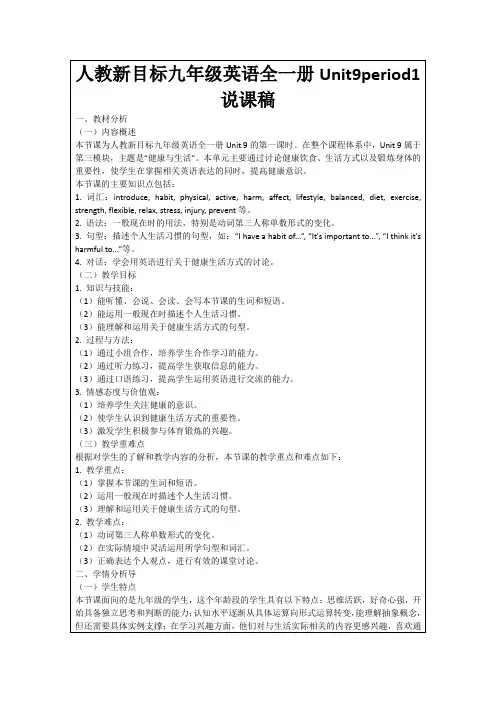
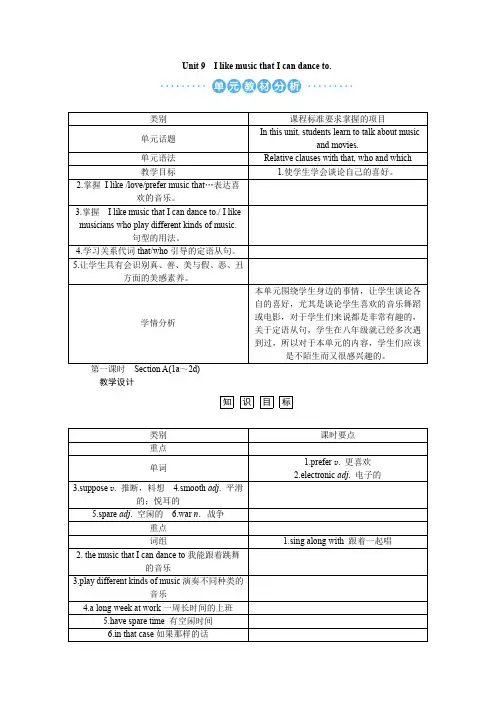
Unit 9I like music that I can dance to.教学设计知识目标课堂环节§自主学习案翻译下列词组。
1.伴随着……唱sing__along__with2.和着……节拍跳dance__to3. 演奏不同种类的音乐play__different__kinds__of__music4.电子音乐electronic__music5.悦耳优雅的音乐smooth__music6.有空闲时间have__spare__time7.既然那样in__that__case8.考虑,思考think__about9.喜欢……胜过……prefer…to…§课堂导学案Step 1 准备与热身(Preparation)T :Do you love music? Yeah, music is also my favorite.It makes my life more colorful.You know, there are different kinds of music in the world.教师播放学生较熟悉的带有歌词或歌手的图片的流行歌曲,激发学生的学习兴趣,同时师生对话,引出本单元的内容学习,为完成1a做铺垫。
T: Do you like music/…?S: Yes, I do.T: What kind of music /…do you like?S: I like…T: Which singer do you like?S: I like…Present some new words and the attributive clause at the same time.Step 2 呈现与输入(Presentation)1.要求学生翻开课本P65,迅速阅读1a部分的内容。
并按要求完成课本上相应的任务。
(1分钟)2.核对答案,先要求全班一起给出答案并检查讨论。
然后要求2-3名同学就“I like music that__.”给出自己的答案,并把收集的答案列举在黑板上。
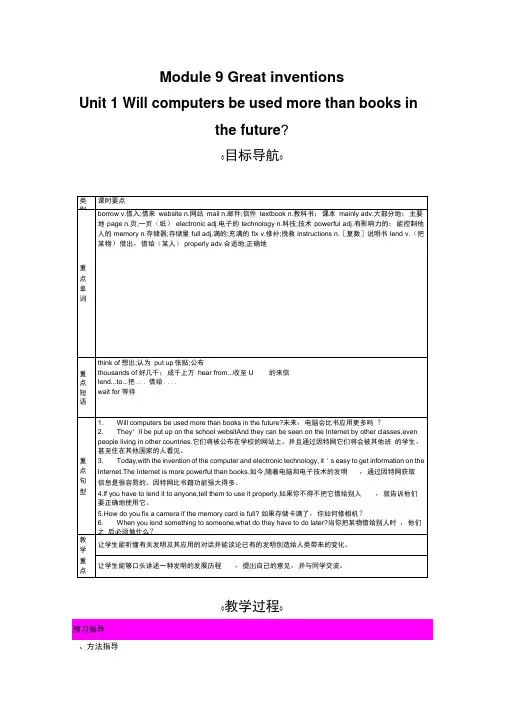
Module 9 Great inventionsUnit 1 Will computers be used more than books inthe future?◊目标导航◊◊教学过程◊1•预习Page 72的生词,做到会读并知意。
2. 预习并讨论Activity 1中的3个问题。
二、预习检测I .根据句意用所给词的适当形式填空1.ln some coun tries,tea is served (serve) with milk and sugar.2. His room isn ' t cleaned/clean(not clean) every day.3. Are her clothes washed (wash) very often?4. He is seen (see) to play football on the playgro und every Sun day morning.5. Who is the baby looked (look) after by?n .按要求完成句子,每空一词1. Mr Green asks the students to speak English in class.(改为被动语态)The students are asked to speak English in class by Mr Green.2. They use the machine for washing clothes.(改为被动语态)The mach in e is used for wash ing clothes by them.3. The boy broke the glass this morning.(改为被动语态)The glass was broken by the boy this morning.4.Students are allowed to ride in the school.(改为否定句)Students aren 't allowed to ride in the school.川.单项填空(B) 1. —Look at the sig n on the right.—Oh,parki ng ______ here.A.doesn ' t allowB.isn ' t allowedC.didn ' t allowD.wasn' t allowed(C) 2.These days stude nts in some schools _____ not to use mobile phon es.A.askB.askedC.are askedD.were asked(D) puters _____ widely in our daily life.eedC.were usedD.are used(A)4.He likes reading very much.Most of his money ________ on books.A.is spe ntB.spe ndC.spe ndsD.are spe nt(A)5.The young man was ofte n seen _______ by the lake.A.to drawB.to draw ingStep 1情景导入Teacher:Let ' s play a guessing gam elescribe an object and you guess what it is,OK? Step 2完成教材Activity 1和Activity 2的任务1. 让学生看Activity 1中的三幅图片并回答问题。
九年级英语Unit9 By the time I got outside,the bus had alreadyleft教案The First PeriodⅠ. Teaching Aims and Demands1. Knowledge Objects(1) Key Vocabularyoversleep(2) Target LanguageWhat happened?I overslept. And by the time I got up, my brother had already gotten in the shower.2. Ability Objects(1) Teach the students to use the new words.(2) Train the students to narrate past events with the Past Perfect Tense.(3) Train the students’listening and speaking skills with the target language.3. Moral ObjectIt’s a good habit to go to bed early in the evening and get up early in the morning. So you’ll never be in a hurry in the morning.Ⅱ. Teaching Key Points1. Key Vocabularyoversleep2. Target LanguageNarrate past events with the Past Perfect TenseⅢ. Teaching Difficult Points1. Train the students to narrate past events with the Past Perfect Tense.2. Train the students to understand the target language in spoken conversation.Ⅳ. Teaching Methods1. Thinking of examples from the students’ real lives.2. Making sentences by looking at the pictures.Ⅴ. Teaching AidA tape recorderⅥ. Teaching ProceduresStep I Revision1. Revise the language points in Unit 8.Ask some questions like this: What volunteer work would you like to do?Help the students to answer, I’d like to…/I love to…/I hope to…2. Practice the dialogue in Activity 3c on page 62 again. Get students to role play the similar dialogues with the following.S A: I’d like to join the school volunteer project, but I’m not sure what I should do.S B: What do you like doing?S A: I love playing football.S B: Well, you could help coach a football team for little kids. Let the children practice in pairs.3. Check the students’homework by asking some students to read their sentences with the phrasal verbs. Then ask the students to hand in their homework. 4. Dictate the following words:clean up, cheer up, give out, put off, set up, run out of, take after, fix up, give away, call up, hand out, work out, hunger, establish, commitment, veterinarian, strategyStep Ⅱ 1aThis activity introduces new vocabulary which can be used to narrate past events.First write by the time on the blackboard. and tell the class the meaning of it."by the time" means not later than, before, as soon as, or when the indicated comes. When we use the words. "By the time…, "we are talking about two different things that happened in the past. Say this sentence to the class: By the time the teacher came in, the students had begun reading English.Tell them to note the struture "had begun" in this sentence. Begun is the past participle of begin. When we talk about two events both happened in the past, the one which happened earlier should use and plus a past participle. The words following By the time…, talk about the thing that happened later. And tell the students when they use had plus a past participle, they are using the Past Perfect Tense. Also explain what is the past participle form of a verb for the students. Tell them it is as the same as the past form for a regular verb. And they have to remember the irregular verbs’participles one by one.Play a game to help the students understand the sentences with the words By the time…Do it like this:Pretend that the teacher will leave the classroom and the students will do some things. When the teacher returns. the class will make statements starting with By the time…Write By the time I came back…on the blackboard.Say to the class, By the time I came in. what had happened?Help one student to answer like this, By the time the teacher came in, Don had written his name on the blackboard.Then get more students to answer differently, such as,By the lime the teacher came in, we had discussed an English problem.By the time the teacher came in, I had drawn a picture.Write these sentences on the blackboard, and teach the students to read several times.Read the instructions to the students and read these questions to the class as well.What do you usually do in, the morning before school? Do you like morning?Why or why not?Choose one good student to answer them by saying something he or she usually does in the morning.He or she may answer like this,I usually get up early, wash my face and have breakfast. I like mornings because the air is fresh, or I usually get up as late as possible. Then I have to wash my face and have breakfast in a hurry. I often rush to school without breakfast. Sometimes I forget something at home. I don’t like mornings because I am always too busy.Then have the whole class practice in pairs. Ask each other the questions.After they finish talking, ask one or two pairs to say their conversations to the class. Correct the mistakes they may make with the other students.Call the students’attention to the pictures in Activity la. Ask students to tell what they see.Say, Any sentences which make sense are accepted to describe the pictures.The girl in the pictures is Tina. Present the new words by providing sentences showing the meanings of them like this:T: What can you see in Picture 1?S1: She slept a long time.T: That’s correct. She slept too late. She overslept. Class repeat. She overslept.S s: She overslept.T: What do you see in Picture 2?S2: Her brother or sister is in the bathroom.T: That’s correct. She wants to go into the bathroom. She can’t because someone is taking a shower. Class repeat. Someone is taking a shower.S s: Someone is taking a shower.Write these words on the blackboard:overslept, taking a shower, had left, left her backpack at home.Then tell students to talk about the pictures in groups of four. Move around the classroom, listening to students and offering help. Make sure that they talk in English.After they all finish talking, ask different groups to tell the class about the pictures. They may say like this:Tina overslept in the morning. She wanted to go to the bathroom, but her brother had already gotten in the shower. When she got to the bus stop, the bus had already left.She had to run to school. After she got to school, she realized she had left her backpack at home. The sentences can vary, but should be correct.Step Ⅲ 1bThis activity gives students practice in understanding the target language in spoken conversation.Ask the students to read the instructions together. Have them look at the two columns, A and B ,in the chart. Point out the sample answer. Read the two parts of the sentence.Then go over the other unconnected parts of sentences, too.You will connect the two parts of the sentences, connect a sentence beginning in the first column with the end of that sentence in the second column. Please guess the other two sentences before I play the tape.I guess most of the children can get the correct sentences by guessing. So just let them guess. Don’t tell them whether their answers are right or wrong.OK, just keep your answers by guessing.Let’s decide if they are right by listening to the tape now.Play the recording for the first time.Students only listen. Then play it a second time. Let students match two parts of each sentence. Check the answers by asking some students to tell their answers.Make sure that all of them have got the correct answers by listening.Saycongratulations to the students who get the answers correctly by guessing.Answers1. b 2. a 3. cTapescriptBoy: Hi, Tina. You look stressed out.Girl: I am. I had a bad morning.Boy: Really? What happened?Girl: Well, first of all I overslept. By the time I got up, my brother had already gotten in the shower.Boy: Oh, what a pain!Girl: So, after he got out of shower, I took a quick shower and got dressed. But by the time I went outside, the bus had already left.Boy: Oh, no!Girl: Oh, yes! So I ran all the way to school. But when I got to school, I realized I had left my backpack at home.Boy: No wonder you look stressed out.Step Ⅳ 1cThis practice provides guided oral practice using the target language.First play the recording in Activity 1bagain and let the students read after it. Do it at least twice.Then read the instructions together with the whole class.You will make conversations in pairs. Each of you will have to take turns being Tina. Look at the pictures in Activity la to help you. Tell your partner what happened to you this morning. Ask a pair to read the example to the class before they begirt S A: What happened?S B: I overslept. And by the time I got up, my brother had already gotten in the shower.Write the conversation on the blackboard.Have the students work in pairs. Move around the room offering language support as needed.After they all finish talking, ask some pairs to say their conversations to the class.Step Ⅴ SummarySay, In this class, we’ve learned how to narrate past events, using the Past Perfect Tense. We’ve also done some listening practice in understanding the target language in spoken conversation. Also, we’ve done much oral practice using the target language.Step Ⅵ Homework1. Write out the story of Tina, Note to use the target language.2. Revise when to use the Past Perfect Tense and the verb structure of it.Step Ⅶ Blackboard DesignUnit 9 By the time I got outside, the bus had already left.The Second PeriodⅠ. Teaching Aims and Demands1. Knowledge Objects(1) Target LanguageBy the time she got to class, the teacher had already started teaching.When she got to school, she realized she had left her backpack at home.When I got home, I realized I had left my keys in the backpack.(2)The Three Forms of the verbs.2. Ability Objects(1) Train the students’ listening skill.(2) Train the students’ writing skill with the target language.(3) Train the students’ speaking skill.(4) Train the students to use the three forms of the verbs.3. Moral ObjectTry to be a careful person and do everything carefully. Remember not to be as careless as Tina.Ⅱ. Teaching Key Points1. Listening practice with the target language.2. Use the correct verb forms to fill in the blanks by listening.3. Make sentences using the Past Perfect Tense.4. The three forms of the verbs.Ⅲ. Teaching Difficult Points1. Write an ending for the story in Activity 2c.2. The three verb forms in Grammar Focus.Ⅳ. Teaching Methods1. Listening2. PairworkⅤ. Teaching AidsA tape recorderⅥ. Teaching ProceduresStep I Revision1. Revise what happened to Tina in the morning by asking one or two students to tell the stroy on page 68.They may say like this:Tina had a bad morning. First of all she overslept. By the time she got up, herbrother had already gotten in the shower.And by the time she went outside, the bus had already left. She had to run all the way to school. When she got to school, she realized she had left her backpack at home. All these made her look stressed out. After that, ask the whole class to work in pairs, telling the stroy and helping each other in turns. Remind them to use the correct verb forms.2. Ask students to check each other’s homework in pairs, pointing out all the mistakes they might have made.3. Revise the Past Perfect Tense by asking the children when to use it and what its verb structure is.Step Ⅱ 2aThis activity provides guided listening practice using the target language.We have known Tina had a bad morning.But something worse happened to Tina later. Let’s go to Activity 2a on page 69 and see what happened to Tina later in the morning.Read the instructions to the class. Be sure that all of them know what to do.Call the students’attention to the four pictures. Get them to guess the correct order of the pictures first. The first one is given as a sample. Ask one or two children to tell their stories by describing the pictures according to their own order.Then, we will hear Tina talking about what happened to her after she got to school. We can see there is a small box in each picture.Please write a number from 1 to 4 in each box to show each picture’s correct order.The first one has been given as a sample.Get the children to get ready to listen to Tina continue her story.Play the recording the first time, students only listen. Play the recording again and ask the children to number each picture.Check the answers with the class and see who have ever got the correct answers without listening.AnswersThe pictures should be numbered in this order:3 1 2 4TapescriptBoy: So then what did you do, Tina?Girl: Well, I ran home to get my backpack.But when I got home, I realized I had left my keys in the backpack.Boy: You’re kidding!Girl: So I ran back to school without my keys or my backpack. And by the time I got back to school, the bell had rung.Boy: Oh, no!Girl: And by the time I walked into class, the teacher had started teaching already. She asked for our homework, but of course I didn’t have it.Step Ⅲ 2bThis activity gives students practice in understanding and writing the target language.Ask the students to read the instructions together. Point out the blanks in the sentences and the verbs in the brackets.This activity has two parts. First let’s fill in the blanks with the correct verb forms. We can see some verbs in the brackets. They are the base forms of the given verbs. For example, get and got, Get is the base form of the verb. Your job is to write the correct forms of these verbs in the blanks. Look at number one.A sample answer is given.Let the students fill in the blanks with the correct forms individually.Move around the classroom collecting the common mistakes they may make.After they all finish writing, tell them to get ready to listen to the conversation and check their answers.I will play the recording again. Please check your answers and correct any mistakes you might have made while listening. Play the recording. Students listen and check their answers. Correct the answers by asking seven different students to say theirs to the class.Answers1. got home 2. realized 3. had left4. got 5. had rung 6. walked 7. had startedStep Ⅳ 2cThis activity gives students oral practice with the target language.Ask the whole class to read the instructions together.We have a new task now. We know Tina was late for class. What do you think happened after Tina was late for class?Work with a partner. Make up an ending for the story by continuing it. The beginning has been given.Get students to discuss in pairs. Complete the ending. Make sure they are talking in English. Move around the classroom, offering language support if needed. After ten minutes, ask students to stop discussing. Get some pairs of students to tell the class how they think the story ended And let the whole class decide whose ending is the best. Tell each pair to write down their ending, or do it after class if time is not enough.Sample ending of the storyThe teacher looked at Tina and said, " Why are you late and where is your homework, Tina?" "I had a bad morning today. " Tina said sadly."I’m sorry to hear that, but may I know what happened? said the teacher.Then Tina told the teacher and the whole class her story. All her classmates laughed loudly after it. Some of them said, "Poor Tina!"Bob, one of Tina’s classmates, stood up and said, "Well, Tina, I’d love to help you. Why not let me keep the keys for you? I would put your keys in my backpack."Step Ⅴ Grammar FocusThis activity introduces the target language of this unit.Call students’attention to the sentences on the left. Ask four different students to read the four sentences and point out where had plus a past participle is used. Write the sentences on the blackboard.Draw a simple time line for each sentence to help students to understand the grammar focus. For example:Then get the students to look at the box.Teach students to read the three forms of each verbs first. Then ask several students to read the verbs to the class to see if they can read. Write the verbs on the blackboard.Ask the students to make sentences correctly using each form of the verbs in the box. For example:I usually get up at 6:30.I got up at 5:30 yesterday.By the time I got up, my sister had already gotten in the shower.Tell the students when we talk about the first thing that happened. We use had plus a past participle (had gotten) and when we talk about the second thing that happened, we use the simple past tense (got up). Ask some to read their sentences to the class.Ask the students to make their own lists of other verbs used in this unit. Tell them to put the lists in their notebooks using a three-column format like the one in the Look! section. The lists have to include these verbs; leave, walk, start, oversleep, ring, be.Check the answers.Some sample sentences with the three verb forms1. I got up at 6:30 every day.I got up at 6:00 yesterday.By the time I got up, my sister had already gotten in the shower.2. We usually go to school at 7:30.We went to school at 8:30 yesterday.By the time we got to the classroom,the students had gone to the chemistry lab.3. My father leaves home at 8:30.He left home at 9:30 this morning.When my father went outside, the bus had left.4. The teacher often starts teaching at 9:00.The teacher started teaching at 8:30 the day before yesterday.When Tina got to class, the teacher had already started teaching.The three forms of the verbs used in this unit:Leave left leftWalk walked walkedstart started startedoversleep overslept oversleptring rang rungbe was/were beenStep Ⅵ SummarySay, In this class, we’ve done much listening and writing practice with target language. We’ve also done some oral practice in pairs. And we’ve discussed the Grammar Focus of this unit.Step Ⅶ Homework1. Write down the ending of Tina’s story.2. Make sentences using each form of the verbs below:leave, walk, start, oversleep, ring, be3. Review the Grammar Focus.Step Ⅷ Blackboard DesignUnit 9 By the time I got outside, the bus had already left.The Third PeriodⅠ. Teaching Aims and Demands1. Knowledge Objects(1) Key Vocabularybell, ring, go off, rush, run off, on time, give sb. a ride, lock, break down (2) Target LanguageBy the time I got there, the bus had already left.By the time I woke up, my father had already gone into the bathroom.2. Ability ObjectsTrain the students’ reading skill with target language.Train the students’ speaking skill with target language.3. Moral ObjectHave you ever done anything carelessly?Share your story with your friends.Ⅱ. Teaching Key Points1. Guide the students to read the article in activity 3a.2. Help the students do the oral practice with the target language.Ⅲ. Teaching Difficult Points1. Help improve the students’ reading skill by Activity 3a.2. Help the students describe what has happened to them with the target language.Ⅳ. Teaching Methods1. Get the main idea by reading.2. Pairwork.Ⅴ. Teaching AidA projectorⅥ. Teaching ProceduresStep Ⅰ Revision1. Revise what happened to Tina by asking several students to tell the story.2. Revise the three forms of the verbs in Grammar Focus by asking four students to write them out on the blackboard.3. Check homework by asking one or two to read their own endings of the stroy.4. Check homework by asking some students to read the sentences which they made.5. Ask the students to hand in their homework.Some sample sentences with the verbs used in this unit:1. I leave home at 7:30 every morning.I left home at 8:00 this morning.By the time I got to the airport, the plane had left.2. I walk to school sometimes.I walked to school yesterday afternoon.When I got there, the sick girl had walk away.3. The meeting start at 3:00 every Wednesday afternoon.The meeting started at 3: 30 last Wednesday afternoon.As soon as Mr. Jones got to the meeting room, the meeting had already started.4. Tina seldom oversleeps.Tina overslept this morning.Tina said she had never overslept before.5. The hell rings at 8:10 every morning.The bell rang at 7:10 this morning.When I got to school, the first bell had rung.6. I am here now.I was at home last night.I had been here for 20 years by the end of 2003.Step Ⅱ 3aThis activity provides reading and writing practice using the target language.Show the vocabulary on the screen by a project:Point to the words one by one and teach the students to read them. Do it several times. Then ask several students to read the words to see if they can pronounce each word correctly.Ask the whole class to read the instructions together. There is an article inActivity 3a. Your task is to read the story and write the events in the correct order.Have a look at the sample answer on the right of the article before you start. Then let the children complete the work on their own. After a while, ask some students to report their answers to the class. Write the events on the blackboard as they report, putting the events in the correct order.After checking the answers, tell students to read the article again more carefully.Tell them to find out the words or sentences which they can’t understand this time.A few minutes later, let the students ask questions on the words and sentences which they can’t understand. Do some explanation and make sure that the students make everything clear about the article.Then ask the students to read the article aloud. Move around the classroom while they are reading, offering help as needed.Next ask students to pick out the sentences with the Past Perfect Tense. Tell them to underline them and come up with the reason to use the tence.Ask two students to read their answers and explain the sentences.Answers1. alarm clock didn’t go off2. father went to bathroom3. woke up late4. took shower5. had some breakfast6. bus left7. ran to bus stop8. started walking9. got a ride with a friend10. bell ringing11. got to school12. got to classSentences with the Past Perfect Tense in the article:1.…by the time I woke up, my father had already gone into the bathroom and…2. Unfortunately, by the time I got there, the bus had already left.Step Ⅲ 3bThis activity provides reading and writing practice using the target language.Call the students’ attention to the photo of the woman sleeping. The girl is sleeping. She may oversleep. How about you?Have you ever overslept?Get a students to answer the question simply, such as Yes, I have. /No, I haven’t.Then ask one student to read the instructions to the class.We can see six questions in the box.You’ll have to read the questions in the box and you have to describe the circumstances in which these things happened.Explain that describe the circumstances means to tell when, where and how the things happened.Ask one student who has ever overslept to answer the first question and describe the circumstance.Help him or her use the Past Perfect Tense to describe the circumstance.Then ask students to read the questions and write their answers in their exercise books. Tell them that they have to describe the circumstances if their answers are Yes, and there should be at least one sentence with the Past Perfect Tense in each description. Move around the classroom providing sentences to the ones who need. Ask several students to share their stories with the class. Correct any mistakes they may make. Let them check the answers in pairs.Step Ⅳ 3cThis activity provides listening and speaking practice using the target language. Ask the whole class to read the instructions together. Then call the students’attention to the sample conversation on the right. Ask a pair of the students to read the conversation to the class. Please ask your partner the questions in Activity 3b. Ask more questions if he or she says "Yes".Ask the students to work in pairs. Encourage them to ask as many questions as they can. As they work, move around the room offering help and answering questions as needed. Ask some pairs to say their conversations to the class.Step Ⅵ SummarySay, In this class, we’ve learned an article. And we’ve done much practice in reading, listening, speaking and writing.We’ve done much practice with the target language.StepⅦ Homework1. Write the answers to the questions in Activity 3b.2. Write a conversation in Activity 3c.StepUnit 9 By the time I got outside, the bus had already left.The Fourth PeriodI. Teaching Aims and Demands1. Knowledge Objects(1) Key Vocabularycostume, show up, exhausted, embarrassed, empty, fool, April Fool’s Day, go off,stay up(2)Target LanguageWhen I got there, I found that he had fooled me.After an hour, the other kids showld up, and I realized that my brother had fooled me.By the time I got to match class, I was exhausted because I had stayed up all night studying.I found out that my friend had fooled me.2. Ability Objects(1) Train the students’writing, listening and speaking skills with the target language.(2)Train the students to use the new vocabulary.3. Moral ObjectHave you ever been fooled on April Fool’sDay? Share your story with your friends.Ⅱ. Teaching Key Points1. Train the students’ listening and speaking skills with target language.2. Teach the students the new vocabulary.Ⅲ. Teaching Difficult Points1. Guide listening and oral practice using the target language.2. Help learn to use the new vocabulary correctly.Ⅳ. Teaching Methods1. Listening2. Pairwork and groupworkⅤ. Teaching AidA tape recorderⅥ. Teaching ProceduresStep I Revision1. Revise the article in Activity 3a on page 70 by asking several students to read it.2. Dictate the following words and phrases:bell, ring, go off, rush, run off, on time, give sb. a ride lock, break down.3. Check the homework.Step Ⅱ 1aThis activity reviews vocabulary, introduces some new vocabulary, and provides writing practice.Read the instructions to the students. Remember to read the sentence in the brackets. Point to the chart with the three headings Nouns, Verbs and Adjectives. Read the words in the brackets to the students and help the students to understand the meanings of nouns, verbs and adjectives.Teach the students to read the new vocabulary below:costume, show up, exhausted, embarrassed, empty, fool,April Fool’s DayWrite them on the blackboard or show them on a screen by a projector while teaching. Tell the children the meaning of each word and do a little explanation.Then call the students’ attention to the list of the words on the left. Ask astudent to read them and tell the meanings at the same time. Find out the words which the students don’t understand and give some explanation.Please put these words in the correct columns in the chart. Some words can be put in more than one column.Get a student to read the sample answers to the class before they start say, Fool call also be a verb. For example, He fooled me. So it is put in both Column Nouns and Column Verbs.Ask the students to complete the chart on their own.Correct the answers by asking three students to read their answers to the class.AnswersNouns: fool, costume, change, clockVerbs: fool, invite, empty, go off, get up, get dressed, show up, realize, change, stay upAdjectives: embarrassed, empty, exhaustedStep Ⅲ 1bThis activity provides guided oral practice using the target language.Ask a student to read the instructions to the class.Ask another student to read the example on the right.Work in pairs now. Tell your partner about something that has happened to you recently. Note to use two or more phrases from the list in Activity la. Get tile students to talk in pairs. Move around the classroom checking their work and offering language support as needed.After they all finish talking, ask some pairs to say their conversations to the class.Step Ⅳ 2aThis activity provides guided listening practice using the target language. Say something about April Fool’s Day to the students like this:Every year on the first of April, Americans do silly things to surprise each other. For example, someone might tell you to go to the teacher’s office to get your new book. But there is no book at all!Call the students’ attention to the four pictures. Ask the students what is happening in each picture.Ask four different students to describe the pictures. For example, ‘they can describe Picture 1 like this:A boy was told to take part in a costume party. So he dressed himself up like a monster. But when he got there he found that his friend had fooled him. It wasn’t a costume party. He frightened the others.Read the instructions to the class.You’ll listen to three boys, Dave, Nick and Joe, talking about April Fool’s Day.There is a box under each picture where you can write each boy’s name. Now listen to the tape and write the name of each boy under his picture. I have to tell you there will be one picture without a name under it.Tell them to see the example for Picture c.Play the tape the first time. The students only listen. Then play the tape again. Ask the students to write each boy’s name in the correct box. Check the answers by asking different students to tell their own answers.。
九年级英语上册Unit9教案一、教学目标1.学习和掌握有关环境保护的词汇和表达方式。
2.通过阅读和听力训练,提高学生的阅读和听力能力。
3.培养学生的合作意识和团队合作能力。
4.培养学生的环保意识,激发保护环境的积极性。
二、教学重点1.学习和运用有关环境保护的词汇和表达方式。
2.提高学生的阅读和听力能力。
三、教学内容本单元的教学内容主要包括以下几个方面:1.单词和短语的学习:学习和掌握与环境保护相关的单词和短语,如recycle, pollution, waste, etc.2.阅读训练:通过阅读短文和课文,提高学生的阅读理解能力。
3.听力训练:通过听力练习,培养学生的听力理解能力。
4.口语训练:在小组合作和角色扮演中,培养学生的口语表达能力。
5.书面表达:通过写作训练,提高学生的书面表达能力。
四、教学准备1.教材:九年级英语上册教材Unit9的课文和练习册。
2.板书:单词和短语、句型和句子示范。
五、教学过程1.导入(5分钟):利用图片或课件展示与环境保护相关的内容,激发学生对环境保护的兴趣,引入本课主题。
2.单词和短语学习(10分钟):通过课件或黑板白板展示有关环境保护的单词和短语,帮助学生学习和掌握这些词汇,并进行相关练习。
3.阅读训练(15分钟):通过课文和短文阅读,培养学生的阅读理解能力,理解文章中的环境保护知识和相关信息。
4.听力训练(15分钟):通过听力练习,帮助学生提高听力理解能力,理解听到的信息,完成相关的听力练习题目。
5.口语训练(20分钟):分为小组合作和角色扮演两个环节,让学生在小组中共同讨论环境保护的问题,并进行角色扮演来进行口语表达训练。
6.书面表达(15分钟):以小组为单位,让学生进行写作练习,写一篇关于环境保护的短文或者写一封环保倡议信,展示他们对环境保护的理解和建议。
7.总结与作业布置(5分钟):对本节课的学习内容进行总结,并布置相关的作业,如预习下一课的内容或完成相关练习题目。
Unit 9 I like music that I can dance to教学目标:能够听懂并口头表达关于音乐类型的信息。
能够用英语描述音乐、乐器、音乐家等。
能够通过听、说、读、写的综合训练提高英语综合运用能力。
教学重点:了解不同音乐类型的特点。
能够用英语描述音乐类型。
学会用定语从句描述自己喜欢的音乐。
教学难点:运用定语从句描述自己喜欢的音乐。
听力训练的提高。
教学准备:多媒体课件。
Unit 9的教材及练习题。
Step 1: Warm-upThe teacher plays a piece of music and encourages students to guess the genre of the music based on the melody and lyrics.The teacher randomly asks students about their knowledge of music.Step 2: PresentationThe teacher introduces different genres of music and plays music of different genres to help students understand the characteristics of each genre.The teacher guides students to discuss the differences between different types of music and to describe the characteristics of different genres of music in English.Step 3: PracticeThe teacher designs a listening exercise where a piece of music is played and students choose suitable adjectives to describe the song.The teacher designs an exercise where students describe their favorite type of music and use relative clauses to describe the genre of music they like.Students work in pairs to discuss their favorite music and share their descriptions using relative clauses.Step 4: Productionteacher asks students to work in small groups and create a playlist of songs for a specific event or occasion, such as a party, a wedding, or a workout session. Each group presents their playlist and explains the reason for choosing the songs.The teacher encourages students to share their opinions about different types of music and engage in a class discussion about the role of music in people's lives.Step 5: Review and AssessmentThe teacher reviews the vocabulary and grammar structures covered in the lesson and provides additional practice exercises to reinforce the learning.The teacher assesses students' understanding of the lesson through a quiz, a writing assignment, or a role-playing activity.The teacher provides feedback and guidance to help students improve their language skills and achieve their learning goals.For homework, students can:Write a paragraph about their favorite type of music and use relative clauses to describe the genre of music they like.Create a playlist of songs for a specific event or occasion and write a short explanation for why each song was chosen.Research a famous musician or band and write a short biography about them, including information about their music and achievements.Listen to a song in a foreign language and write a brief summary of the lyrics, including any new vocabulary or expressions they learned.Watch a movie or TV show that features music as a major theme or plot element, and write a review of the film, focusing on how the music enhances the story or characters.。
Unit 9 I like music that I can dance to.Period 1 Section A(1a-2d)【知识与能力目标】1) 能掌握以下单词及短语:prefer, lyrics, Australian, electronic, suppose, smooth, spare, director, case, in the case, war2)掌握I like /love/prefer music that…表达喜欢的音乐。
3)掌握I like music that I can dance to. /I like musicians who play different kinds of music. 句型的用法。
3) 学习关系代词that/who引导的定语从句。
【过程与方法目标】本课主要采用任务型教学法,情景教学法以及多媒体辅助教学,充分发挥教师的主导作用和学生的主体地位。
利用现代化教育技术优化教学过程,通过课件为学生创设更多生动活泼的语言环境,把学生吸引到活动中去,并激发他们主动参与学习的欲望,努力培养学生自主学习的能力。
把学习的钥匙交给学生,在传授知识的同时,授以科学的思维方法。
不仅要使学生学会,更要使学生会学。
因此在课堂教学中巧妙的运用教学艺术,适当安排小组交流、全班讨论、游戏、竞赛等活动,鼓励学生勇于说、乐于说。
提高运用语言的能力,变“讲堂”为“学堂”,变“要我学”为“我要学”。
从而从根本上打破传统的课堂教学模式,建构一种新型的现代教育模式。
使学生在更轻松、更愉快的环境下实现更多的信息交流,真正做到快快乐乐学英语,扎扎实实打基础。
【情感态度价值观目标】1. 使学生学会谈论自己的喜好。
2. 通过表达个人喜好,提高学生欣赏美的水平。
3. 激发学生的学习兴趣和学习热情。
【教学重点】1)prefer, different kinds of sing along with的用法。
2)句型:I like music that I can dance to.I like musicians who play different kinds of music.【教学难点】学习关系代词that/who引导的定语从句。
【教学步骤】Step 1. Warm- upGreet the students.Step 2. Lead-inT: What kind of books do you like? I like interesting books. I like books that are interesting.Write…that are interesting on the blackboard. Point to it and ask who can make another sentence with it. Write another phrase on the blackboard, …that is comfortable to ….Help the students to make sentences with it.Step 3. Presentation1. Play a pop song that Ss are familiar with in order to arouse their interest.T: Do you like music/…?S: Yes, I do.T: What kind of music /… do you like?S: I like…T: Which singer do you like?S: I like…2. Play the tapes of different kinds of music for the students, only a short piece of each tape. Say, I like music that makes me relaxed. Write these four groups of words on the blackboard,…that has great lyrics,…that I can sing along with,…that isn’t too loud, …that I can dance to. Tell the students lyrics means the words of the songs. Ask the students, What kind of music do you like?Say, You can answer with I like music…, I love music…, I prefer music… Explain prefer=like…better to them. Get one of the children to answer the question, then let this child ask the one next to him/her the same question. Set off a chain drill. Explain that I like music that isn’t means that I don’t like too loud music.3. Show students some different kinds of pictures of movies and ask students to discuss what kind of movies they like in pairs.4. Discussion: 1a.Ss talk about their hobbies in groups. T makes a summary. Lead to the key sentences.I prefer music that has great lyrics.I love music that I can sing along with.I like music that I can dance to.Step 4. ListeningListen to 1b and check the kinds of music Tony and Betty like.Music that I can dance to Music that has great lyrics Music that I can sing along withTonyBettyStep 5. Pair workFinish 1c. Make a conversation between you and your partner about the music that you like.A: What kind of music do you like?B: I like music that I can sing along with. What about you?A: I prefer music that has great lyrics.Step6. Listening2a. Listen to the tape for the first time and finish 2a.1. Carmen likes musicians who play different kinds of music. T F2. Xu Fei likes the Australian singer Dan Dervish. T F3. Carmen likes electronic music that’s loud. T F4. Xu Fei prefers groups that play quiet and slow songs. T F2b.Listen to the tape for the second time and finish 2b.Carmen says 1. I really love Dan Dervish. I like musicians ______________________________2. The Modern are really great. I love electronic music ___________Xu Fei says 3. I like musicians ______________________4. I think The Modern are too noisy. I prefer groups ______________________________Step 7. Practice1. Make conversations using the information in 2a and 2b.A: Does Xu Fei like The Modern?B: No, he doesn’t. He prefers…2. Ask a few pairs of students to present their conversations to the class.Step 8. Reading.1. Read the conversation and answer the questions.(1) What kind of music does Scott like? Why?(2) Does Scott like serious movies?(3) What kind of movies does Jill want to see?2. Role-play the conversation in 2d.(I)I’ll just listen to this new CD I bought.(2)I suppose I’ll just listen to this new CD I bought.(3)I like smooth music that helps me relax after a long week at work.(4)I only like movies that are funny.(5)In this case, I’ll ask someone who likes serious movies.(6)I prefer movies that give me something to think about.Step 9. Language points1. Hmm, depends which movie.1) 本句省略了depends前的主语it和which movie后的从句部分we’ll watch,这是典型的口语表达形式。